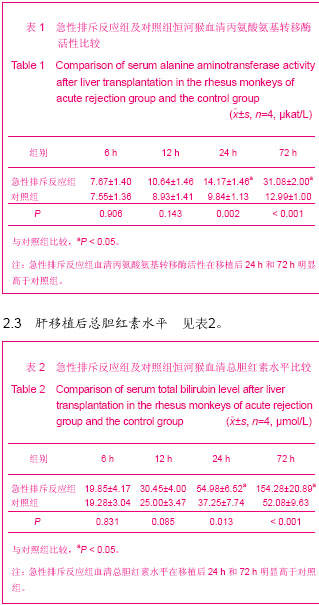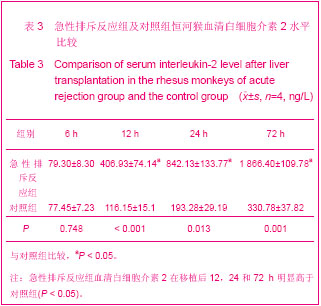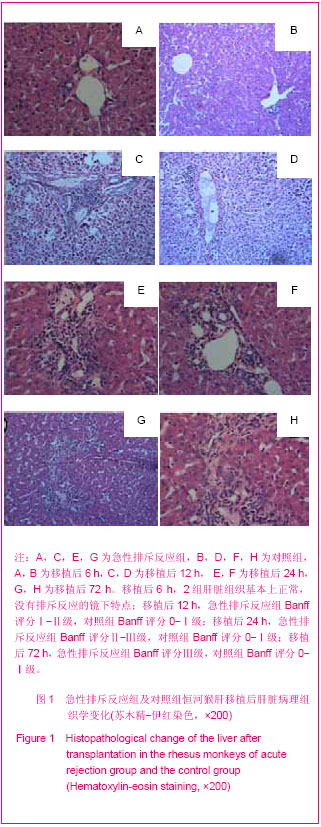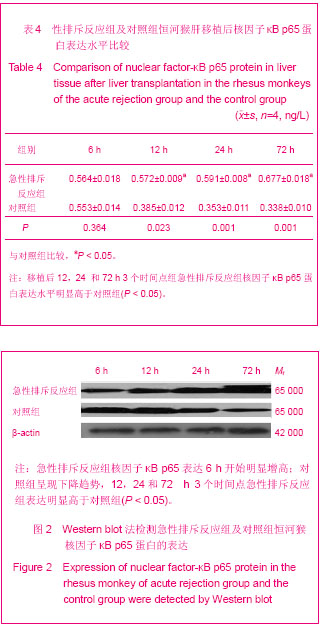| [1] Molinero LL, Alegre ML.Role of T cell-nuclear factor κB in ransplantation.Transplant Rev (Orlando). 2012 ;26(3): 189-200. [2] Tsoulfas G, Geller DA. NF-kappaB in transplantation: friend or foe? Transpl Infect Dis. 2001;3(4):212-219.[3] 冉江华,张升宁,刘静,等. 恒河猴同种异体原位肝移模型的改进[J].中国普外基础与临床杂志,2010;17(7):694-798.[4] Demetris A, Adams D, Bellamy C,et al.Update of the International Banff Schema for Liver Allograft Rejection: working recommendations for the histopathologic staging and reporting of chronic rejection. An International Panel. Hepatology. 2000;31(3):792-799.[5] Sánchez-Fueyo A, Strom TB.Immunologic basis of graft rejection and tolerance following transplantation of liver or other solid organs. Gastroenterology. 2011;140(1):51-64. [6] Uemura T, Ikegami T, Sanchez EQ,et al. Late acute rejection after liver transplantation impacts patient survival.Clin Transplant. 2008;22(3):316-323. [7] Finn PW, Stone JR, Boothby MR,et al. Inhibition of NF-kappaB-dependent T cell activation abrogates acute allograft rejection.J Immunol.2001;167(10): 5994-6001.[8] Ding X, Wang X, Xue W,et al. Blockade of the nuclear factor kappa B pathway prolonged islet allograft survival.Artif Organs. 2012;36(3):E21-27. [9] Wei JF, Zheng SS.NF-kappa B in allograft rejection. Hepatobiliary Pancreat Dis Int. 2003;2(2):180-183.[10] May MJ, Ghosh S. Rel/NF-kappa B and I kappa B proteins: an overview. Semin Cancer Biol. 1997;8(2):63-73.[11] Oeckinghaus A, Hayden MS, Ghosh S. Crosstalk in NF-κB signaling pathways.Nat Immunol. 2011;12(8):695-708.[12] Pasparakis M. Role of NF-κB in epithelial biology. Immunol Rev. 2012;246(1):346-458.[13] Vallabhapurapu S, Karin M.Regulation and function of NF-kappaB transcription factors in the immune system. Annu Rev Immunol. 2009;27:693-733.[14] Gilmore TD, Wolenski FS.NF-κB: where did it come from and why? Immunol Rev. 2012;246(1):14-35. [15] Urbanova M, Brabcova I, Girmanova E,et al. Differential regulation of the nuclear factor-κB pathway by rabbit antithymocyte globulins in kidney transplantation. Transplantation. 2012;93(6):589-556. [16] Hayden MS, West AP, Ghosh S.NF-kappaB and the immune response. Oncogene. 2006;25(51):6758-6780.[17] Mason NJ, Artis D, Hunter CA.New lessons from old pathogens: what parasitic infections have taught us about the role of nuclear factor-kappaB in the regulation of immunity. Immunol Rev. 2004;201:48-56.[18] Lan W, Petznick A, Heryati S, et al.Nuclear Factor-κB: central regulator in ocular surface inflammation and diseases.Ocul Surf. 2012;10(3):137-148.[19] Shih VF, Davis-Turak J, Macal M,et al.Control of RelB during dendritic cell activation integrates canonical and noncanonical NF-κB pathways.Nat Immunol. 2012;13(12):1162-1170. [20] Xie J, Wang Y, Bao J,et al.Immune tolerance induced by RelB short-hairpin RNA interference dendritic cells in liver transplantation. J Surg Res. 2013;180(1):169-175.[21] Hayden MS. A less-canonical, canonical NF-κB pathway in DCs.Nat Immunol. 2012;13(12):1139-1141. [22] Eldor R, Abel R, Sever D,et al. Inhibition of nuclear factor-κB activation in pancreatic β-cells has a protective effect on allogeneic pancreatic islet graft survival. PLoS One. 2013; 8(2):e56924. [23] Kaileh M, Sen R.NF-κB function in B lymphocytes. Immunol Rev. 2012 ;246(1):254-271. [24] Gerondakis S, Siebenlist U. Roles of the NF-kappaB pathway in lymphocyte development and function.Cold Spring Harb Perspect Biol. 2010;2(5):a000182.[25] Porras DL, Wang Y, Zhou P,et al.Role of T-cell-specific nuclear factor κB in islet allograft rejection. Transplantation. 2012;93(10):976-982.[26] Goebeler M, Gillitzer R, Kilian K,et al.Multiple signaling pathways regulate NF-kappaB-dependent transcription of the monocyte chemoattractant protein-1 gene in primary endothelial cells. Blood. 2001;97(1):46-55.[27] Visekruna A, Volkov A, Steinhoff U. A key role for NF-κB transcription factor c-Rel in T-lymphocyte-differentiation and effector functions.Clin Dev Immunol. 2012;2012:239368.[28] van den Hoogen MW, Hoitsma AJ. Anti-T-cell antibodies for the treatment of acute rejection after renal transplantation.Expert Opin Biol Ther. 2012;12(8):1031-1042. [29] Wang YL, Tang ZQ, Gao W, et al. Influence of Th1, Th2, and Th3 cytokines during the early phase after liver transplantation. Transplant Proc. 2003;35(8):3024-3025.[30] Millán O, Rafael-Valdivia L, Torrademé E,et al. Intracellular IFN-γ and IL-2 expression monitoring as surrogate markers of the risk of acute rejection and personal drug response in de novo liver transplant recipients.Cytokine. 2013;61(2):556-564.[31] Brunet M.Cytokines as predictive biomarkers of alloreactivity. Clin Chim Acta. 2012;413(17-18):1354-1358. [32] Millán O, Rafael-Valdivia L, Torrademé E,et al. Intracellular IFN-γ and IL-2 expression monitoring as surrogate markers of the risk of acute rejection and personal drug response in de novo liver transplant recipients. Cytokine. 2013;61(2): 556-564.[33] Maguire O, Collins C, O'Loughlin K,et al.Quantifying nuclear p65 as a parameter for NF-κB activation: Correlation between ImageStream cytometry, microscopy, and Western blot. Cytometry A. 2011;79(6):461-469.[34] Giardino Torchia ML, Conze DB, Jankovic D,et al.Balance between NF-κB p100 and p52 regulates T cell costimulation dependence. J Immunol. 2013;190(2):549-555. [35] Koch L, Fritzsching B, Frommhold D,et al.Lipopolysaccharide-induced expression of Th1/Th2 cytokines in whole neonatal cord and adult blood: role of nuclear factor-kappa B and p38 MAPK. Neonatology. 2011; 99(2):140-145. [36] Schmitz ML, Krappmann D.Controlling NF-kappaB activation in T cells by costimulatory receptors. Cell Death Differ. 2006;13(5):834-842.[37] Scheinman RI, Cogswell PC, Lofquist AK,et al.Role of transcriptional activation of I kappa B alpha in mediation of immunosuppression by glucocorticoids. Science. 1995; 270 (5234):283-286.[38] 万云乐,吴丽花,赵志成,等.他克莫司对移植免疫反应中核因子κB活性和淋巴细胞趋化因子表达的影响[J]. 中华移植杂志: 电子版, 2010,4(1):38-42.[39] Ouk S, Liou ML, Liou HC. Direct Rel/NF-κB inhibitors: structural basis for mechanism of action.Future Med Chem. 2009;1(9):1683-1707. [40] Ueki S, Yamashita K, Aoyagi T, et al. Control of allograft rejection by applying a novel nuclear factor-kappaB inhibitor, dehydroxymethylepoxyquinomicin. Transplantation. 2006; 82(12):1720-1727. |




.jpg)